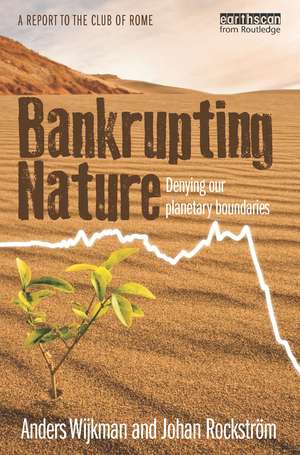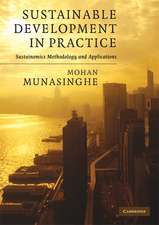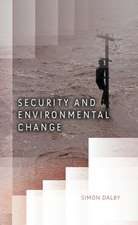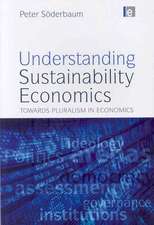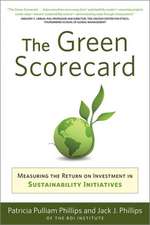Bankrupting Nature: Denying Our Planetary Boundaries
Autor Anders Wijkman, Johan Rockströmen Limba Engleză Hardback – 5 noi 2012
The book breaks the long silence on population, criticizing donor countries for not doing enough to support the education of girls and reproductive health services. It is shown that an economy built on the continuous expansion of material consumption is not sustainable. De-growth, however, is no solution either. The growth dilemma can only be addressed through a transformation of the economic system. A strong plea is made for abandoning GDP growth as the key objective for development. The focus should instead be on a limited number of welfare indicators. The trickle-down concept is seriously questioned, to be replaced by one of sufficiency. Rich countries are called upon to hold back their material growth to leave room for a rising living standard among the poor. Alternative business models are presented, such as moving from products to services or towards a circular economy based on re-use, reconditioning and recylcing – all with the aim of facilitating sustainable development.
A Report to the Club of Rome
Preț: 329.21 lei
Nou
Puncte Express: 494
Preț estimativ în valută:
62.99€ • 65.77$ • 52.14£
62.99€ • 65.77$ • 52.14£
Carte disponibilă
Livrare economică 15-29 martie
Preluare comenzi: 021 569.72.76
Specificații
ISBN-13: 9780415539692
ISBN-10: 0415539692
Pagini: 222
Ilustrații: 15 black & white illustrations, 15 black & white line drawings
Dimensiuni: 156 x 234 x 17 mm
Greutate: 0.45 kg
Ediția:1
Editura: Taylor & Francis
Colecția Routledge
Locul publicării:Oxford, United Kingdom
ISBN-10: 0415539692
Pagini: 222
Ilustrații: 15 black & white illustrations, 15 black & white line drawings
Dimensiuni: 156 x 234 x 17 mm
Greutate: 0.45 kg
Ediția:1
Editura: Taylor & Francis
Colecția Routledge
Locul publicării:Oxford, United Kingdom
Public țintă
Academic, General, Professional Practice & Development, and UndergraduateCuprins
Foreword 1. The Limited Environmental Capacity 2. Anders Wijkman – On politics in crisis 3. Johan Rockström – On science’s role and responsibility 4. From Copenhagen to Durban 5. Respect The Planetary Boundaries 6. A Triply Green Revolution 7. The Critical Role of Energy 8. The Forgotten Issue 9. The Weapon of Doubt 10. The Greenhouse Effect 11. What Climate Denies Do Not Want To Know 12. The Arctic: Canary in the mine 13. Is Sweden a World Champion in Climate Policy 14. Getting the Economy Right 15. The Financial Sector: Ignoring The Risks 16. Growth’s Dilemma 17. Toward A Circular Economy 18. How much is enough? 19. The Road Ahead Index
Notă biografică
Anders Wijkman is Advisor at the Stockholm Environment Institute, Sweden, and Co-President, Club of Rome. He has been a Member of the Swedish Parliament and of the European Parliament, as well as Director General of the Swedish Red Cross, Director General of the Swedish Agency for Research Cooperation with Developing Countries and Assistant Secretary General of the UN and Policy Director of the United Nations Development Programme. He is a member of the Swedish Royal Academy of Sciences and the World Academy of Art and Science.
Johan Rockström is a Professor in Natural Resource Management at Stockholm University, and the Executive Director of the Stockholm Resilience Centre. He is an internationally recognized scientist on global sustainability issues, for example leading the recent development of the new Planetary Boundaries framework for human development in the current era of rapid global change. He also co-chairs Future Earth, and international initiative on global sustainability.
Johan Rockström is a Professor in Natural Resource Management at Stockholm University, and the Executive Director of the Stockholm Resilience Centre. He is an internationally recognized scientist on global sustainability issues, for example leading the recent development of the new Planetary Boundaries framework for human development in the current era of rapid global change. He also co-chairs Future Earth, and international initiative on global sustainability.
Recenzii
"... unlike previous pessimistic assessments of tipping points for humanity and Earth, this book by Johan Rockström, head of the Stockholm Resilience Centre, and Anders Wijkman, a former member of the European Parliament, combines a critique of political and economic systems with an assessment of global ecology. It is an extension of the influential planetary-boundaries idea that Rockström and colleagues first published in Nature in 2009." – Peter Kareiva, chief scientist at The Nature Conservancy in Arlington, Virginia, Nature, October 2012
"The world is headed for a major transition and unless we recognize and deal with that, it could very well be a major disaster for humanity. Wijkman and Rockström have provided the clear evidence and practical policy ideas to allow us to seize this moment as an opportunity to make the transition to a much better, more sustainable and desirable world. We cannot afford to miss this opportunity." – Robert Costanza, Visiting Fellow, Crawford School of Public Policy, Australian National University, Editor-in-Chief of Solutions and Senior Fellow, Stockholm Resilience Center, Stockholm, Sweden
"... this contribution by Wijkman and Rockström is so important. It does not leave us with the problem alone. It takes us to the blueprint for a true-green economy. It is about the way that we can reinvent growth for all, which is affordable, equitable and sustainable." – Sunita Narain, Director-General, Centre for Science and Environment, New Delhi
"Wijkman and Rockström convincingly show the strength and necessity of an integrated systems perspective of world development, that combines an understanding of how climate change interacts with ecosystem changes across the world, and how social and ecological factors interplay and ultimately determine our ability to provide welfare and wellbeing for a rapidly growing world population. Their book is a timely wake-up call for all politicians, businessmen and citizens of Earth." – Pavan Sukhdev, Founder-CEO of GIST (Green Indian States Trust) Advisory and Study Leader of TEEB
"The public discussion on climate change and the environment has lost its momentum. The focus is on other issues, like finance and the economy. Wijkman and Rockström show convincingly why this must change. Wealth generation based on carbon can not continue much longer. We are borrowing resources belonging to future generations, and in the process imperiling their right to livelihood. Today´s great denial will be revealed. The combination of solid science, vast experience from politics and public affairs and profound compassion makes this book extraordinarily useful." – Anders Wejryd, Archbishop of Sweden
"Growth has pushed the physical scale of the economy beyond planetary boundaries and has thereby become uneconomic growth – growth that now increases environmental and social costs faster than production benefits, making us poorer, not richer. This book will help citizens, and maybe even politicians and economists, understand what is happening." – Herman E. Daly, Professor Emeritus, School of Public Policy, University of Maryland, USA
"Bankrupting Nature summarizes succinctly our human challenges, correctly focusing on re-designing today’s global financial casino. Ignored in most textbooks, finance is now a flywheel of social and environmental destruction while economists are still suffering 'theory-induced blindness'. The authors demonstrate conclusively that it is high time for humanity to grasp scientific realities and re-integrate our knowledge systemically – Important, constructive advice for politicians, scientists, NGOs and all who work toward cleaner, greener, equitable, sustainable human futures." – Hazel Henderson, author, President Ethical Markets Media (USA & Brazil) producers of the Green Transition Scoreboard®, Transforming Finance Based on Ethics and Life’s Principles, co-creators of the Calvert-Henderson Quality of Life Indicators
"Since 2007, more books are taking an economic approach in arguing for investment in renewables and phase-out of fossil fuels - and Bankrupting Nature: Denying Our Planetary Boundaries could be among the more engaging, even offering hope that dependence on fossil fuels can be overcome ... Bankrupting Nature offers a crash-course on sustainability challenges - a sincere and polite contribution to the conversation needed between those who aim for action to slow climate change and those who want to continue with business as usual." – Susan Froetschel, Yale Global Online
"The book is written in an engaging and accessible style. There are diagrams a
d graphs to illustrate trends but happily the volume is largely uninterrupted by excessive referencing. Historical facts, political negotiations and the often complex nature of environmental problems and the state of scientific knowledge are explained with significant clarity. Each chapter is short — averaging 10 pages — which adds to the readability and will be a blessing for the busy academic, scholar and practitioner. The result is a highly readable and intelligible volume that leaves no excuses for future inaction ... a particular strength of this volume lies in the clarity of writing making it accessible to a broad audience extending well beyond scholars and academics. It will be essential reading for environmental lawyers wishing to remain informed of multi-disciplinary developments in the area. The book is recommended for anyone who is concerned about the state of the global environment and natural resources and has interests in the future sustainability of planet earth." – Erika J. Techera, Asia Pacific Journal of Environmental Law
"This book shows that an economy built on the continuous expansion of material consumption is not sustainable. Based on the increased evidence of the uncanny correlation between the escalating rates of global economic growth and environmental degradation, this book continues to raise worldwide awareness of environmental problems created as the result of anthropogenic activities. Bankrupting Nature demonstrates that we are still in deep denial about the magnitude of the global environmental challenges and resource constraints facing the world... The book is extremely helpful in raising awareness of the issues as well as possible solutions." – Helen Kopnina, Trumpeter
"Clearly written and structured, with useful references and figures, this book is persuasive in calling for an interdisciplinary approach to address the issues facing science and society at large." – Cally Harmer, Sherkin Comment
"The writing style is concise and engaging and is supported by compelling graphs which support their arguments. One of the great strengths of the authors is their fluency in environmental economics. Wijkman and Rockstrom directly confront the arguments of neoliberal economists who assert that the world cannot afford the radical measures required to prevent climate change." – Chris Peters, EINGANA
"This is one of the best-informed overviews of our planetary situation and should be compulsory reading for all political representatives." – David Lorimer, Network Review
"The world is headed for a major transition and unless we recognize and deal with that, it could very well be a major disaster for humanity. Wijkman and Rockström have provided the clear evidence and practical policy ideas to allow us to seize this moment as an opportunity to make the transition to a much better, more sustainable and desirable world. We cannot afford to miss this opportunity." – Robert Costanza, Visiting Fellow, Crawford School of Public Policy, Australian National University, Editor-in-Chief of Solutions and Senior Fellow, Stockholm Resilience Center, Stockholm, Sweden
"... this contribution by Wijkman and Rockström is so important. It does not leave us with the problem alone. It takes us to the blueprint for a true-green economy. It is about the way that we can reinvent growth for all, which is affordable, equitable and sustainable." – Sunita Narain, Director-General, Centre for Science and Environment, New Delhi
"Wijkman and Rockström convincingly show the strength and necessity of an integrated systems perspective of world development, that combines an understanding of how climate change interacts with ecosystem changes across the world, and how social and ecological factors interplay and ultimately determine our ability to provide welfare and wellbeing for a rapidly growing world population. Their book is a timely wake-up call for all politicians, businessmen and citizens of Earth." – Pavan Sukhdev, Founder-CEO of GIST (Green Indian States Trust) Advisory and Study Leader of TEEB
"The public discussion on climate change and the environment has lost its momentum. The focus is on other issues, like finance and the economy. Wijkman and Rockström show convincingly why this must change. Wealth generation based on carbon can not continue much longer. We are borrowing resources belonging to future generations, and in the process imperiling their right to livelihood. Today´s great denial will be revealed. The combination of solid science, vast experience from politics and public affairs and profound compassion makes this book extraordinarily useful." – Anders Wejryd, Archbishop of Sweden
"Growth has pushed the physical scale of the economy beyond planetary boundaries and has thereby become uneconomic growth – growth that now increases environmental and social costs faster than production benefits, making us poorer, not richer. This book will help citizens, and maybe even politicians and economists, understand what is happening." – Herman E. Daly, Professor Emeritus, School of Public Policy, University of Maryland, USA
"Bankrupting Nature summarizes succinctly our human challenges, correctly focusing on re-designing today’s global financial casino. Ignored in most textbooks, finance is now a flywheel of social and environmental destruction while economists are still suffering 'theory-induced blindness'. The authors demonstrate conclusively that it is high time for humanity to grasp scientific realities and re-integrate our knowledge systemically – Important, constructive advice for politicians, scientists, NGOs and all who work toward cleaner, greener, equitable, sustainable human futures." – Hazel Henderson, author, President Ethical Markets Media (USA & Brazil) producers of the Green Transition Scoreboard®, Transforming Finance Based on Ethics and Life’s Principles, co-creators of the Calvert-Henderson Quality of Life Indicators
"Since 2007, more books are taking an economic approach in arguing for investment in renewables and phase-out of fossil fuels - and Bankrupting Nature: Denying Our Planetary Boundaries could be among the more engaging, even offering hope that dependence on fossil fuels can be overcome ... Bankrupting Nature offers a crash-course on sustainability challenges - a sincere and polite contribution to the conversation needed between those who aim for action to slow climate change and those who want to continue with business as usual." – Susan Froetschel, Yale Global Online
"The book is written in an engaging and accessible style. There are diagrams a
d graphs to illustrate trends but happily the volume is largely uninterrupted by excessive referencing. Historical facts, political negotiations and the often complex nature of environmental problems and the state of scientific knowledge are explained with significant clarity. Each chapter is short — averaging 10 pages — which adds to the readability and will be a blessing for the busy academic, scholar and practitioner. The result is a highly readable and intelligible volume that leaves no excuses for future inaction ... a particular strength of this volume lies in the clarity of writing making it accessible to a broad audience extending well beyond scholars and academics. It will be essential reading for environmental lawyers wishing to remain informed of multi-disciplinary developments in the area. The book is recommended for anyone who is concerned about the state of the global environment and natural resources and has interests in the future sustainability of planet earth." – Erika J. Techera, Asia Pacific Journal of Environmental Law
"This book shows that an economy built on the continuous expansion of material consumption is not sustainable. Based on the increased evidence of the uncanny correlation between the escalating rates of global economic growth and environmental degradation, this book continues to raise worldwide awareness of environmental problems created as the result of anthropogenic activities. Bankrupting Nature demonstrates that we are still in deep denial about the magnitude of the global environmental challenges and resource constraints facing the world... The book is extremely helpful in raising awareness of the issues as well as possible solutions." – Helen Kopnina, Trumpeter
"Clearly written and structured, with useful references and figures, this book is persuasive in calling for an interdisciplinary approach to address the issues facing science and society at large." – Cally Harmer, Sherkin Comment
"The writing style is concise and engaging and is supported by compelling graphs which support their arguments. One of the great strengths of the authors is their fluency in environmental economics. Wijkman and Rockstrom directly confront the arguments of neoliberal economists who assert that the world cannot afford the radical measures required to prevent climate change." – Chris Peters, EINGANA
"This is one of the best-informed overviews of our planetary situation and should be compulsory reading for all political representatives." – David Lorimer, Network Review
Descriere
This powerful book shows us that we are in deep denial about the magnitude of the global environmental challenges and resource constraints facing the world. It tackles major issues facing global society such as resource depletion and populations growth and makes a strong plea for a radical rethink of approaches to economic stability and sustainable development.
